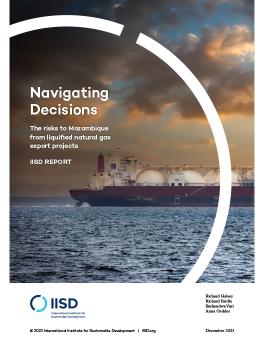
Navigating Decisions: The risks to Mozambique from liquified natural gas export projects
Liquified natural gas (LNG) export projects have been promoted as a way to boost economic development in Mozambique. The European Union has ties to all these projects. This report highlights the negative impacts, economic concerns with project designs, and risks to both future government revenues and sovereignty. Decision-makers should reconsider these LNG projects and investigate more sustainable alternatives for Mozambique.
-
The TotalEnergies Mozambique LNG project has received disproportionate public finance support—60 times that of renewable energy in the country. It has also increased national oil company debt and sovereign liability.
-
Risks to future financial benefits to Mozambique from LNG projects include delayed government revenues, decreased global LNG demand, volatile gas prices, trade competition, and the security situation near LNG facilities.
-
International investment law protects LNG projects at Mozambique's expense, restricting government actions and placing significant liability on the state.
The climate science is clear that there should be no new natural gas project developments, including in Mozambique, if the world is to limit global warming to 1.5°C. Nevertheless, on a purely social and economic basis, there are significant risks that undermine the contribution LNG is expected to make to the Mozambique economy. Most of the proposed financial benefits to Mozambique rely on robust international demand for LNG in the late 2030s and 2040s, which is looking increasingly unlikely. At this juncture, as the global energy transition away from fossil fuels gathers pace, more sustainable projects should be favoured over further investment in LNG.
You might also be interested in
November 2024 | Carbon Minefields Oil and Gas Exploration Monitor
In October 2024, 20 oil and gas exploration licences were awarded across three countries, with a significant portion granted by Brazil.
Unlocking Supply Chains for Localizing Electric Vehicle Battery Production in India
This study aims to highlight the key supply chain barriers in localizing electric vehicle (EV) battery cell manufacturing in India. It summarizes consultations with 12 companies, as well as experts and policy-makers, to determine the crucial challenges and opportunities in localizing battery manufacturing in India.
COP 29 Must Deliver on Last Year’s Historic Energy Transition Pact
At COP 29 in Baku, countries must build on what was achieved at COP 28 and clarify what tripling renewables and transitioning away from fossil fuels means in practice.
What Will Happen at COP 29?
Talks at the 2024 UN Climate Change Conference (COP 29) will range from defining a way forward on finance through a new collective quantified goal (NCQG) to mitigation, and loss and damage. Ahead of negotiations in Baku, IISD’s Earth Negotiations Bulletin Team Lead Jennifer Bansard examines the agenda and breaks down what to watch as eyes turn to Azerbaijan.